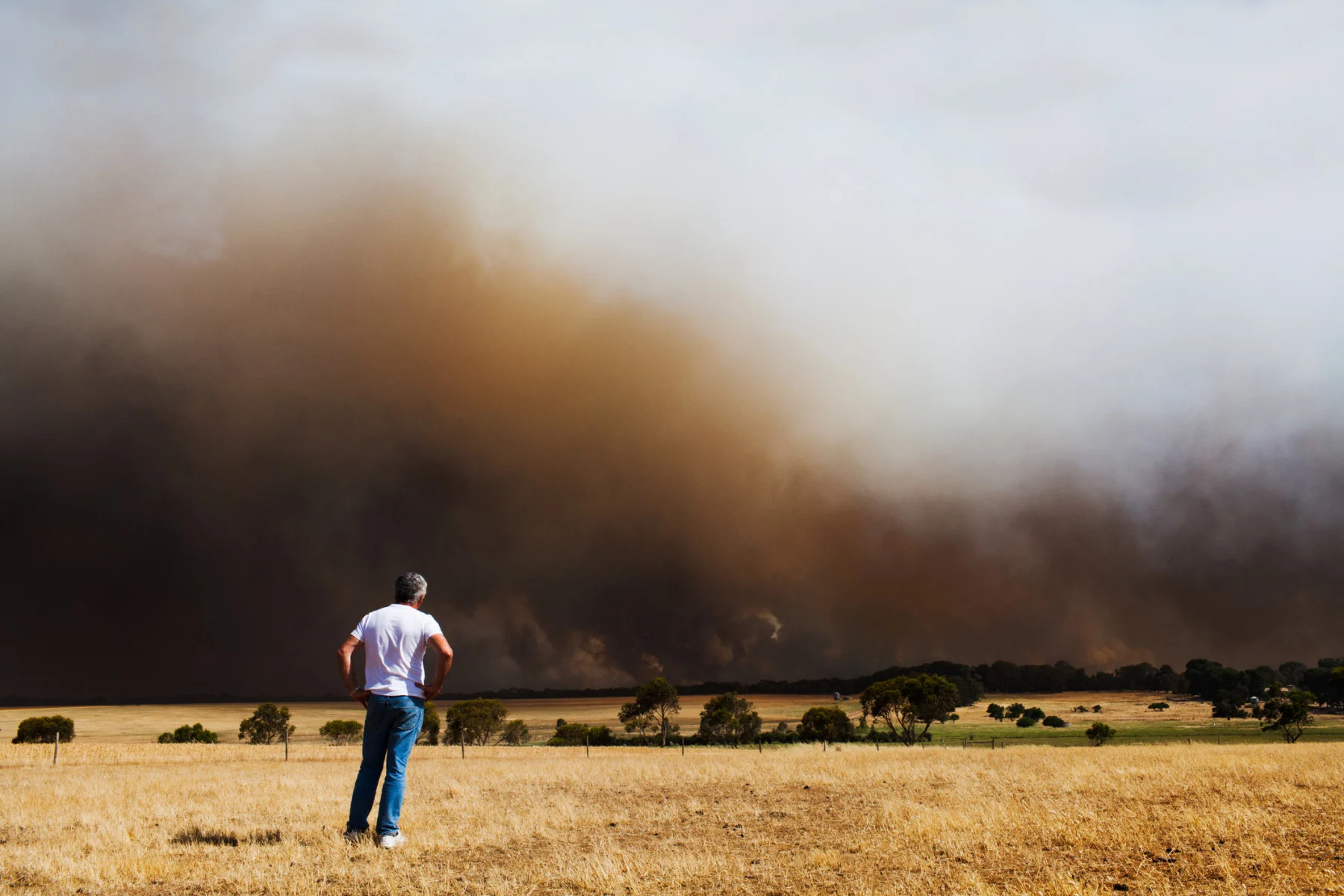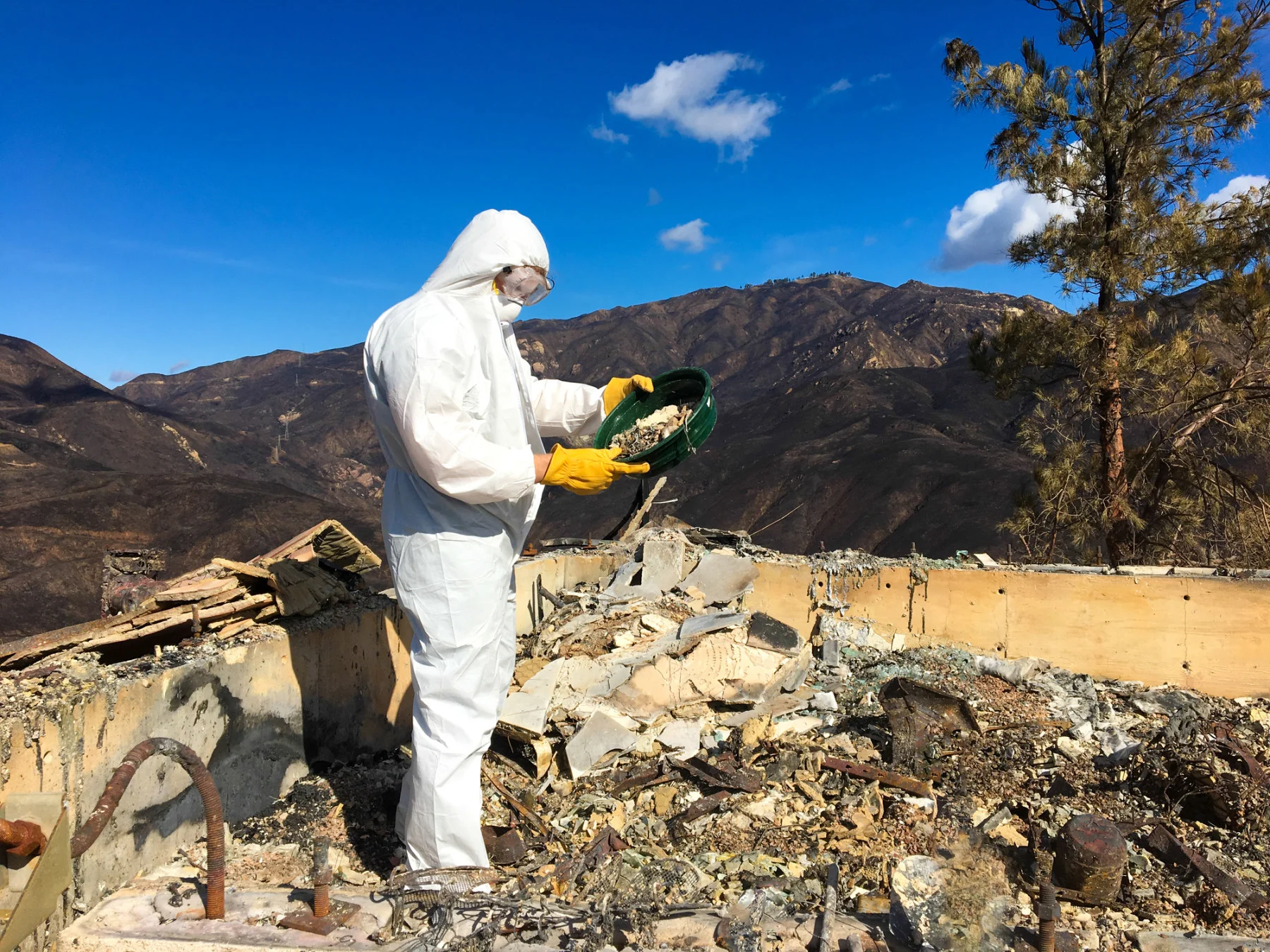
How much will the health impacts of climate change cost us?
Part 2: A climate and health analysis considers the financial costs of the health risks related to climate change.
The latest research into population health impacts of climate change has come in. And so have the costs of these impacts.
The study, Health of Canadians in a Changing Climate: Advancing our Knowledge for Action, is based on the contributions of more than 80 experts who evaluated the latest climate research to determine the current and future health risks posed by climate change. Ultimately, the report aims to serve as a map for how the country should respond.
The estimated economic costs of the health impacts of climate change in Canada stand out in the report as steep.
According to the report, acute health impacts will cost Canada in the range of $410 million to almost $2 billion annually. Chronic health impacts will rise to as much as $29 billion a year.

A man in hazmat suit sifts through ash and toxic waste after the Woolsey wildfire (2018) in Malibu, CA, USA.(JannHuizenga/ E+/ Getty Images)
These costs will manifest in a variety of forms, many of which are already apparent, such as injuries caused by wildfires, flooding, or severe storms; treatment for diseases like West Nile Virus and Lyme disease, which are on the rise; and harm caused by heat waves.
“We estimate the cost of heat-related deaths and hospitalizations could be more than $10 billion per year three decades from now, unless we do a better job of preparing,” Senior Adaptation Researcher with the Canadian Institute for Climate Choices (CICC), Dylan Clark, told The Weather Network (TWN).
CICC performed the largest analysis of health-related climate costs last year and found that many other serious health-based costs are more hidden.
“We found that, for instance, the costs linked to increasing ground-level ozone — a component of urban smog which increases with warmer temperatures — could approach $100 billion per year by the mid-century unless adaptations are scaled up and fossil fuel emissions are reduced,” Clark said.
“There are also many effects that a warming and increasingly volatile climate will have on people’s health that are harder to assign a cost to,” Clark added.
“Climate change is likely to impact people’s mental health, lead to ecosystem changes, and negatively impact cultures and ways of life. These losses may not be on balance sheets or in government budgets, but to overlook them risks ignoring some of the most critical impacts of climate change on health and well-being.”
Adaptation is at the heart of the report’s recommended responses, including “adjusting our decisions, behaviours, and activities.”
“It’s really about preparedness — developing plans that can be activated when there is an extreme event and over the longer term re-designing our communities for the future,” Professor Michael Bauer, of the University of British Columbia’s School of Population and Public Health, told TWN.
Bauer cites such examples as “more emphasis on shade trees and less heat absorbing building materials, changing building codes to improve natural ventilation, re-purposing land to absorb water during flooding events, and expanding marshes in coastal areas.”
“Building community resilience is key. That can mean putting systems in place for checking in on seniors who live alone during extreme heat events, or setting up clean air shelters for wildfire smoke events,” Brauer added.
“Overall there is a need to strengthen the public health system so that it can respond to extreme weather events. Generally, the more that disparities in health are reduced and the more that overall health is improved the more likely that impacts can be mitigated.”
The report’s health-focussed adaptations are also essential, and include “significantly ramped-up efforts to train health care professionals,” “improving access to healthcare and housing quality,” and pursuing “adaptation actions that are inclusive and equitable and consider the needs of racialized, marginalized, and low income populations.”
The report also stresses that reducing greenhouse gas emissions (GHGs) can still have “significant immediate and long-term co-benefits for health.” It notes how the cost of GHG reduction and adaptation will in part be off-set by the financial value of the health benefits.
It warns, however, that deaths in this country will “increase significantly by the end of the century due to the effects of rising temperatures” if GHG emissions are not curbed.
The next step will be putting these plans into action, a serious challenge in itself.
“The key challenge is really re-thinking for a new reality that will develop and increasingly worsen over time,” Brauer said.
“Impacts may now be sporadic and appear as one-off unique events, but they will become increasingly frequent, more severe, and more common. This means taking a longer-term view — implementing policies now for a future that is likely unimaginable to many.”
Brauer noted the opportunity to deal with other serious problems while also addressing climate change.
“Reducing air pollution will provide immediate benefits while also reducing emissions that drive climate change. Greening our cities also has immediate benefits to health and will also protect against extreme heat and flooding in the future.”
As Clark told TWN, “This level of coordination and planning will not be easy in Canada’s complicated federal system. However, failure will mean that climate-related illness and death will continue to increase as our climate continues to change, costing us billions and reducing our quality of life.”
See Part 1 of our coverage on health-related risks associated with a warming world, here.
Thumbnail credit: Robert Lang Photography/ Moment/ Getty Images











